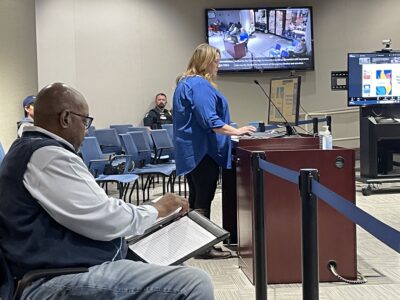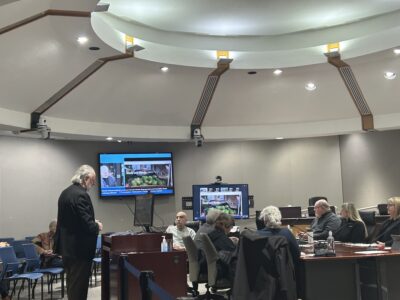
Brownback wants drugs for poor nations
Not much to pontificate about today. Let’s go to the links…Sam Brownback links(KC Star) Brownback’s plan would entice cures for diseases: Sam Brownback doesn’t begrudge American men their drugstore virility. He just thinks drug companies should focus on saving more than people’s sex lives.The Kansas senator, a Republican and a leading social conservative, has introduced legislation that he hopes will spur drug companies to develop cures for diseases that debilitate and kill millions of people every year in poor nations.The carrot: If the companies come up with such cures, they would get six-month to two-year extensions on patents for the so-called “lifestyle” drugs aimed at problems like erectile dysfunction. A patent extension on a single popular drug could be worth billions of dollars to a company’s bottom line, experts said.(Yekir.am in Armenia) Bill on Support to South Caucasus States Introduced before US Senate: A bill on support to states of the South Caucasus and Central Asia for ensuring US national security interests, containing Russia’s geopolitical ambition, as well as creation and support to a network of US military bases is introduced before the US Senate. Bill co-sponsor, Senator Sam Brownback (R-KS) stated that US vital interests in the Caspian region include ensuring independence and security of Azerbaijan and Georgia. Extremely important pipelines of oil and gas transit pass through those countries. (Washington Post) Senate, House GOP increasingly at odds: From immigration policy to energy to emergency spending, House Republican leaders are publicly breaking ranks with their counterparts in the Senate, fearing that Senate efforts at compromise are jeopardizing the party’s standing with conservative voters.The tension, in some sense, is built into the system, said Sen. Sam Brownback, R-Kan., a former House member. Because they represent an entire state, senators must tend toward compromise. Since senators stand for re-election every six years, only 15 Republicans are facing this year’s stiff headwind, compared to all 231 Republicans in the House. Some House Republicans believe their Senate colleagues are insensitive to their political difficulties.(Dallas Morning News)Migrant expenses may fall to states: As the Senate inches toward votes on a plan that would legalize millions of immigrants, one topic remains unaddressed: What would be the effect on state and local governments?Legalization supporters argue that the Congressional Budget Office estimate ignores the gains that would accrue if illegal immigrants come out of the shadows: more tax payments, greater worker productivity and the prospect that some would move to better-paying jobs with health insurance.”I hope we also get some credit in cost estimates] for how much these people are going to be working and how much they are going to be paying in taxes,” said Sen. Sam Brownback, a Kansas Republican who strongly supports the Senate legalization plan. “Immigration study after study has shown this is a powerful, positive force in this economy.”How to contactAs always, you can find information to contact members of the Kansas congressional delegation [here.
Inflation drives drug costs
Prescription prices rose 10 percent last year, study finds
St. Louis ? Prescription drug costs rose 10 percent last year, a smaller increase than expected, according to a study of patients who are covered by Express Scripts Inc.
The pharmacy benefit manager said its clients spent about $707 per person last year for medications without any cost controls in place. That’s up from about $640 in 2003, excluding high-cost injectable drugs, the company said in its 2004 Drug Trend report. The data are based on 3 million of Express Scripts’ 50 million plan members.
Prescription costs increased by 10.6 percent last year – 3.9 percentage points lower than in 2003 and less than the anticipated 14 percent to 15 percent. Several factors fueled the rise.
“Inflation was the biggest trend driver,” said Brian Kolling, senior director for Express Scripts, based in Maryland Heights, Mo.
Inflation accounted for 70 percent of the cost increase, while 27 percent was the result of growing prescription use. The remaining 3 percent came from the cost of new drugs entering the market.
“It was not a strong year for new drugs,” Kolling noted.
Spending on medications slowed because of the withdrawal from the market on Sept. 30 of Vioxx. The arthritis drug was pulled because a study suggested it doubled the risk of heart attack and stroke. Fear drove down demand for similar medications, such as Celebrex and Bextra.
Drug spending also grew more slowly because of fewer cases of colds and flu, as well as decreased antidepressant use following government warnings about teen suicide and their use, Kolling said.
He projected that costs would rise about 12 percent this year. And “we should see similar price increases over time,” Kolling said.
But with drug prices rising faster than wages and inflation every year for a decade, more people are being priced out of the medications they need, said Ron Pollack, executive director of advocacy group Families USA in Washington.
“These skyrocketing prices are designed to pad the bottom line. The pharmaceutical companies have enjoyed far higher profit margins than any industry in the United States,” Pollack said.
“They often say they need high prices for research and development, but many of these drugs have been on the market for many years, and all the costs have been accounted for,” he said. “For these prices to rise faster than inflation only serves to pad the stock values of the drug companies.”
In 2003, the pharmaceutical industry ranked third in profitability, with net income of 14 percent, compared with 5 percent for all Fortune 500 firms, according to the Kaiser Family Foundation.
To control prescription costs for companies, Express Scripts created several programs aimed at steering employees and doctors toward less expensive generic drugs. Use of such programs, which the company calls step therapy, has nearly tripled among its clients during the past three years.
Firms that used no cost-control techniques had a 9.3 percent increase in plan costs. Companies that used two or more control methods held the line, the report said.
“One of the greatest opportunities to lower your drug spending is use of generics,” said Brenda Motheral, Express Scripts’ vice president for product development.
Pharmaceutical companies have several new drugs that could come to market in the next few years, driving up demand and costs, Kolling said. For instance, if the Food and Drug Administration approves release next year of the drug Acomplia from Sanofi-Aventis, it could be in high demand, depending on how it is approved and marketed. The drug is aimed at treating obesity, diabetes, smoking addiction and metabolic disorders.
If the drug is approved for treatment of diabetes, most plans will cover it, Kolling said. But if it is approved primarily as a weight control medicine, plans are less likely to pay for it, he said.
“It is something that will get a lot of media attention if it comes out next year,” he predicted.
FDA chief: Drug importation illegal
Kansas Republican supports changing law
States that are importing drugs from Canada are violating federal law, the acting commissioner of the Food and Drug Administration said Wednesday.
Lester Crawford said about 25 states – including Kansas – either have programs to import drugs at a reduced cost, or are considering proposals to do so.
But Crawford reiterated a point he’s made before – that the programs violate the federal Food, Drug and Cosmetics Act.
“What’s happening is illegal,” Crawford said. “And until Congress repeals that act, there’s nothing we can do but uphold that position.”
Crawford, at Kansas University’s Adams Alumni Center for a public health conference, said his agency had “tried to be patient with people” bringing drugs into the United States aboard buses. He said interviews with people found with imported drugs hadn’t led to arrests.
Gov. Kathleen Sebelius has decided to bring Kansas into the I-SaveRx program with four other states. The importation of drugs from that program could save consumers up to 50 percent on about 100 prescription drugs.
Atty. Gen. Phill Kline ruled in April that the state’s participation in the program didn’t violate Kansas statutes. However, he acknowledged the agreement, at best, “comes perilously close to causing violations of (federal law) and at worst does cause such violations.”
Rep. Jim Ryun, a Republican from Kansas who attended the conference, said he supported changing the federal law to allow drug importation.
“If we can find a way to deliver these drugs from overseas, let’s say from Canada, and we can prove the safety and soundness of them, I can support that,” Ryun said.
Drug trial begins for ex-LHS star, his brother
Kansas City, Kan. ? A former Lawrence High School basketball star turned to selling drugs to make quick money, a prosecutor told jurors Wednesday in a trial in U.S. District Court.
Maurice “Mo” Trotter could have earned $240 per week working at basketball camps or $5.15 an hour working at an athletic club, assistant U.S. Atty. Terra Morehead told jurors during her closing argument.
“Or, you could do a single drug transaction that takes literally seconds or minutes and make those amounts at the drop of a hat,” Morehead said.
Jury deliberations are expected to begin this morning in the trial of Trotter, a former standout at LHS and Illinois State University, and his younger brother, Mardell. The two are charged with a combined 12 counts, including conspiring to distribute crack cocaine, powder cocaine and marijuana within 1,000 feet of Kennedy, New York and Central Junior High schools.
Morehead said when that police served a search warrant in August 2004, they found $2,372 in cash on Maurice Trotter’s person and in his clothes at his home and more than $10,000 cash in Mardell Trotter’s possession. The case against them is based on a series of undercover buys through informants, drugs found in a storage locker, marked bills recovered after the search, and drugs found at three Lawrence homes: 338 Ind., 809 N.Y. and 1504 E. 21st Terrace.
But defense attorneys say the case relies on the word of unreliable witnesses – “four crackheads,” in the words of Maurice Trotter’s attorney, Melanie Morgan.
The key witness against the Trotters was Royce King, a Lawrence drug dealer who helped officers with the joint city-county Drug Enforcement Unit set up undercover buys.
Morgan called the controlled buys “not-so-controlled buys” and said it was possible that the drugs King delivered to police after them had come from his own stash.
Mardell Trotter’s attorney, Kirk Redmond of Lawrence, criticized police for allowing King to continue selling crack throughout Lawrence while he was working for them.
“I’d submit that’s just a perverse result,” he said.
He said King had a strong motive to lie about his dealings: the desire to stay out of prison.
“Who in this room believes Royce King?” Redmond asked jurors.
But Morehead argued that King never had large amounts of money and only dealt in small amounts of drugs when he was running errands for the Trotters.
“Royce King was their middleman. He was their flunky,” Morehead said. “He washed the cars. He cleaned up the house. He was someone they could keep under their thumb.”
Maurice Trotter graduated from LHS in 1992. During his senior year, he helped lead the team to a fourth-place finish in the Class 6A state tournament, and he said in a 1996 Journal-World interview that he had dreams of reaching the NBA.
Police began investigating the Trotters after complaints from residents in the Pinckney neighborhood that the duplex at 338 Ind. was a nuisance.
The brothers were arrested Aug. 6, 2004, after Lawrence Police executed a search warrant on the homes and the storage locker. Police said the search yielded 2 ounces of crack cocaine and 2 ounces of powder cocaine, worth up to $6,000. Police also seized a 9 mm handgun.
Maurice Trotter was 30 and Mardell Trotter was 29 at the time they were charged.







